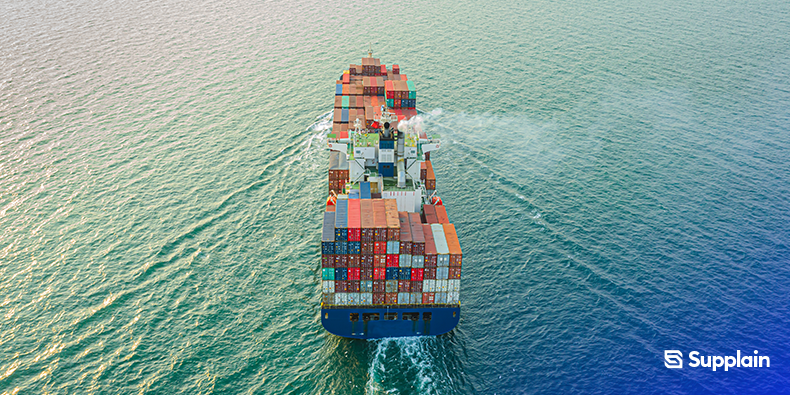
Daily we read about the problems related to global supply chains. From a lack of lorry drivers causing fuel, food and clothing not to be delivered to petrol stations, restaurants and shops fast enough to aftershocks caused by the global COVID-19 pandemic, the closing of shipping lanes, and the war in Ukraine have severely strained global supply chains.
Consumers have seen shortages at the petrol pumps, causing long queues for fuel. Some shops and restaurants are running out of particular kinds of food, and what is available has skyrocketed in value. Several countries have reported inflation rates of 20+%!
Why are we witnessing such strain on our global supply chains, and why does it matter to us?
What is a global supply chain?
A global supply chain is a network between an organisation and its suppliers and consumers that incorporates all the transactions in transforming raw goods into marketable products.
Global supply chain networks include the activities, people, technology, information and resources. In contrast, the functional teams involved in the company's network include sales, sourcing, procurement, manufacturing, logistics and customer service - where the consumer receives the product they ordered or wish to purchase.
The supply chain process has developed over the centuries. Now, the leading global supply chain partners have a competitive advantage by executing quicker, reducing friction through all internal and external steps, thus bringing more transparency throughout the process of delivering a product or service beyond the end customer's expectations. Consider how Amazon can now provide products to our doors within 24 hours!
Leaders in global supply chain management understand that their organisation's supply chain is more than the movement of goods from manufacturing to consumers. Supply chain innovators combine business processes and supply chain networks and deliver the best service and product under a single collaborative system that provides the ultimate customer experience.
Why is a good supply chain vital?

Supply chains play a significant role in customer satisfaction through the delivery of products and services. Good supply chains are critical for reducing operating costs in procurement activities, operations, logistics, and the whole supply chain. The scale of profitability for large organisations is relative to supply chain management.
Supply chains also have a lesser publicised societal role – ensuring that the necessities humans depend on, like food, energy, medicine, and modern infrastructure, are flowing and available.
Both domestic and global supply chains will involve the following:
- moving raw materials and creating them into saleable products,
- coordinating the work of suppliers, manufacturers, warehouses, retailers and transportation partners
- transportation to the distribution site,
- consumer distribution
- managing the logistics of operations, marketing, product development, marketing, finance, customer service, finance
- business development and distribution
Good supply chains improve an organisation's financial position by delivering much-needed goods and services and facilitating job creation at the same time.
Why are supply chains good for global economies?

It is well known that the supply chain is an integral part of most businesses and is essential to business success, customer satisfaction and societal growth.
Global supply chains have become a robust method of organising investment, production and trade in the global economy. Many countries, particularly developing countries, have benefitted from supply chains boosting employment opportunities for economic and social development.
However, it should be noted that the same supply chains can have the opposite effect, negatively impacting decent working conditions and leading to international hostility between states who are jealous of each other's supply chain wealth.
Global supply chains, then, are complex, fragmented, diverse, yet highly dynamic and evolving organisational structures, but they can provide several benefits.
What are the risks and disruptions to global supply chains?

Dispersed supply chains develop because stakeholders find it is economically advantageous to seek the least expensive and most efficiently productive sources of supply. These fragmented and dispersed supply chains have developed for apparent reasons. Still, they created complex interdependencies whose risks have become too volatile once one section of the supply chain is impacted.
Supply chain interdependence is evident within our highly globalised trading world. It is unlikely to change in the next decade unless there is increased interoperability between organisations and nations. However, with this interdependence comes increased risk. In the case of supply chains, risks are often never fully appreciated until too late.
Whilst the motives for creating these supply chains lie primarily with private business interest, the impact of supply chain disruption that can be manifested by natural disasters, pandemics and human conflict — is rarely localised.
When a disruption occurs in one industry, the disturbances impact adjacent industry sectors and begin to affect the entire economy of not only that country but also regional and globally.
The impact on vulnerable populations is particularly noteworthy. Supply chain disruptions do not only create higher prices and shortages amongst high-end consumer technology products, like mobile phones. They also affect commodities, including generic drugs, food or energy, increasing living costs for those struggling most within society.
Supply chain disruption thus creates instability more generally, promoting conditions for conflict between and within nations. At the time of writing this article, the Ukraine war has caused massive disruptions to food and energy supply chains, causing prices to skyrocket and inflation to grow in every country.
As affluent nations and individuals can find ways to mitigate shortages, they begin to hoard what they have, impacting those who need it most. In these cases, the stakeholders face shortages occasioned by interdependence and seek security for themselves in ways that foster broader international systemic instability.
Global supply chains matter because they impact us all

The global supply chain can make manufacturers and industry sectors more efficient, productive and profitable by reducing costs and encouraging business enterprises to expand into international markets.
Global supply chains must ensure that the international networks of manufacturers, vendors, warehouses, transportation companies, distributors, and retailers operate smoothly.
Whether a business, organisation, or government, the communication between them needs to be standardised. Otherwise, miscommunication, interoperability, supply chain data silos and bottlenecks will begin to form, whether this is the timely delivery of everything from raw materials to finished consumer goods as they travel from manufacturers and suppliers to wholesalers, retailers, and other distribution points.
The goals of supply chain stakeholders are to reduce costs, improve efficiency, and mitigate risk, which is achievable through increased operability.

![Here are the best NFT games [Updated List]](https://strapi.supplain.io/uploads/What_is_so_special_about_a_World_of_Freight_NFT_and_what_will_move_the_project_forward_b89946b520.png)
